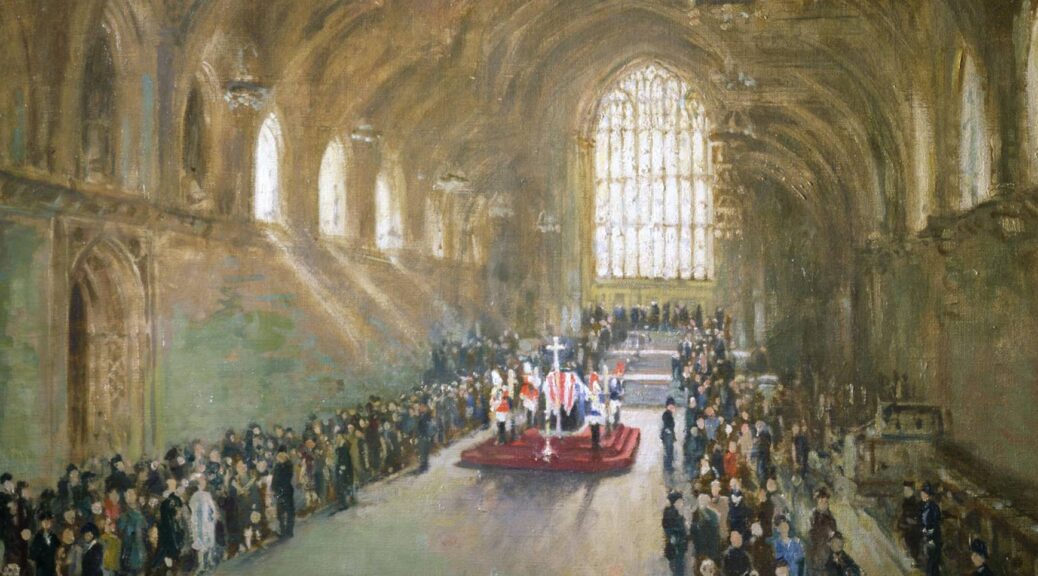
“At Bladon”: Fifty-nine Years On, Echoes and Memories
“When we were fifty-nine years younger”…
For those of a certain age, my friend Dave Turrell sent a message under this title on January 24th. On that day fifty-nine years ago, the Great Man departed. I saved the words for today’s anniversary, six days, later: the interment at Bladon.
Recalling January 30th, Lord Moran reached what Anthony Montague Browne described as “the top of his stylistic form.” As did dear Anthony himself, and the irreplaceable Grace Hamblin.
The poem “At Bladon” was read by Robert Hardy at the gravesite during our penultimate Churchill Tour in 2006. It is today fifty-nine years since Richard Dimbleby made the words indelible.
Charles Wilson, Lord Moran MC PRC
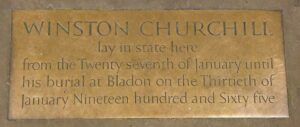
“He was taken at night to Westminster, to the Hall of William Rufus, and there for three days he lay in state, while the people gathered in crowds that stretched over Lambeth Bridge to the far side of the river, to do honour to the man they loved for his valour.
“On the fourth day he was borne on a gun-carriage to St. Paul’s. There followed a long line of men in arms, marching to sorrowful music. With all the panoply of Church and State, and in the presence of his Queen, he was carried to an appointed place hard by the tombs of Nelson and Wellington, under the great dome, while with solemn music and the beating of drums the nation saluted the man who had saved them and saved their honour.
“The village stations on the way to Bladon were crowded with his countrymen, and at Bladon in a country churchyard, in the stillness of a winter evening, in the presence of his family and a few friends, Winston Churchill was committed to English earth, which in his finest hour he had held inviolate.” [1]
Grace Hamblin OBE
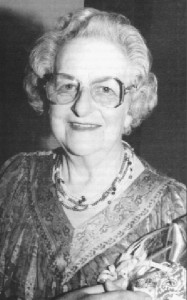 “At the end, I went down with the family to the funeral, near his beloved birthplace, Blenheim, and to me that quiet, humble service in the country churchyard was much more moving than had been the tremendous pomp and glory of the state ceremony in London. As the train made its slow journey through the snow-covered countryside on that bitterly cold day, men and women were standing in their little gardens behind their cottages, out in the fields or in the stations as we passed, the men with their heads bared, saying a silent farewell to their hero.
“At the end, I went down with the family to the funeral, near his beloved birthplace, Blenheim, and to me that quiet, humble service in the country churchyard was much more moving than had been the tremendous pomp and glory of the state ceremony in London. As the train made its slow journey through the snow-covered countryside on that bitterly cold day, men and women were standing in their little gardens behind their cottages, out in the fields or in the stations as we passed, the men with their heads bared, saying a silent farewell to their hero.
“I thought of these people at home, and I thought of you, and the hundreds and hundreds of letters Lady Churchill received from all over the world. And I pondered on what had made this dynamic but gentle character so beloved and respected—and such a wonderful person to work for. I think what one found first was courage. He had no fear of anything, moral or physical. There was sincerity, truth and integrity, for he couldn’t knowingly deceive a cabinet minister or a bricklayer or a secretary. There was forgiveness, warmth, affection, loyalty and, perhaps most important of all in the demanding life we all lived, there was humour, which he had in abundance.
“I hope I shan’t be infringing any copyright or displeasing anyone if I slightly misquote a passage from one of those many, many letters Lady Churchill had received on his death. It came from a distinguished member of your community here in America, and it has always been in my mind. ‘That he died is unimportant, for we must all pass away. That he lived is momentous to the destiny of decent men. He is not gone. He lives wherever men are free.'” [2]
Sir Anthony Montague Browne CBE DFC
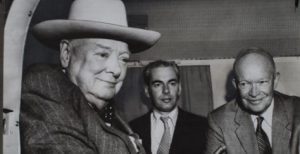
“The procession to the graveyard at Bladon was brief, and we were few in number. We filed past the grave for the last time before it was closed. I was astonished to see a small and not particularly distinguished row of medals lying on the coffin. I could only suppose that it had fallen from the chest of one of the military coffin-bearers, and wondered if it would remain there to perplex archaeologists of many centuries hence.
“We took our departure for London in the freezing dusk…. At the back of my own mind there was the old quotation from WSC himself, of the death of Richard Coeur de Lion: ‘Worthy, by the consent of all men, to sit with King Arthur and Roland and other heroes of martial romance at some eternal Round Table, which we trust the Creator of the Universe in His comprehension will not have forgotten to provide.’
“On the way home, my mind was a blank. I tried to say some silent prayers for that brave and generous soul, but they were choked and confused, and came to nothing. I could not mourn for him: he had so clearly and for so long wanted to leave the World. But I was submerged in a wave of aching grief for Britain’s precipitous decline, against which he had stood in vain. When I reached our flat in Eaton Place it had been burgled.” [3]
“At Bladon”: Robert Hardy CBE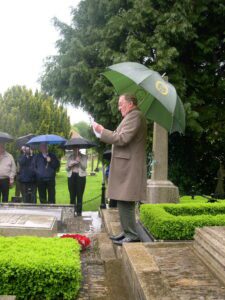
Drop English earth on him beneath
do our sons; and their sons bequeath
his glories and our pride and grief
at Bladon.
For Lionheart that lies below
that feared not toil nor tears nor foe.
Let the oak stand tho’ tempests blow
at Bladon.
So Churchill sleeps, yet surely wakes
old warrior where the morning breaks
On sunlit uplands. But the heart aches
at Bladon. [4]
Credits
1. Charles Wilson, Lord Moran, Winston Churchill: The Struggle for Survival, 1940-1965, Taken from the Diaries of Lord Moran (London: Constable, 1966), 842.
2. Grace Hamblin, “Frabjous Days: Chartwell Memories 1932-1965,” International Churchill Conference, Dallas, 20 October 1987.
3. Anthony Montague Browne, Long Sunset: Memoirs of Winston Churchill’s Last Private Secretary (London: Cassell, 1995) 328.
4. Richard Dimbleby read the poem “At Bladon,” by Avril Anderson, in a breaking voice over the BBC on 30 January 1965.







2 thoughts on ““At Bladon”: Fifty-nine Years On, Echoes and Memories”
I was 13 when Churchill died. Although my memories are vague, I remember coverage of some of the events on TV. I was aware of his role in saving Britain and the Allies in the Second World War. I am enjoying your articles on him.
Very nicely done!
Comments are closed.